[Milkvetches: The Genus Astragalus East of the Cascade
Mountains of Oregon and Washington]
Basalt Milkvetch, Basalt Milk-vetch, Threadstalk Milkvetch, Threadstalk Milk-vetch
Astragalus filipes
Synonyms: Astragalus filipes var. residuus, Astragalus macgregorii, Astragalus stenophyllus, Astragalus stenophyllus var. filipes, Astragalus stenophyllus var. stenophyllus
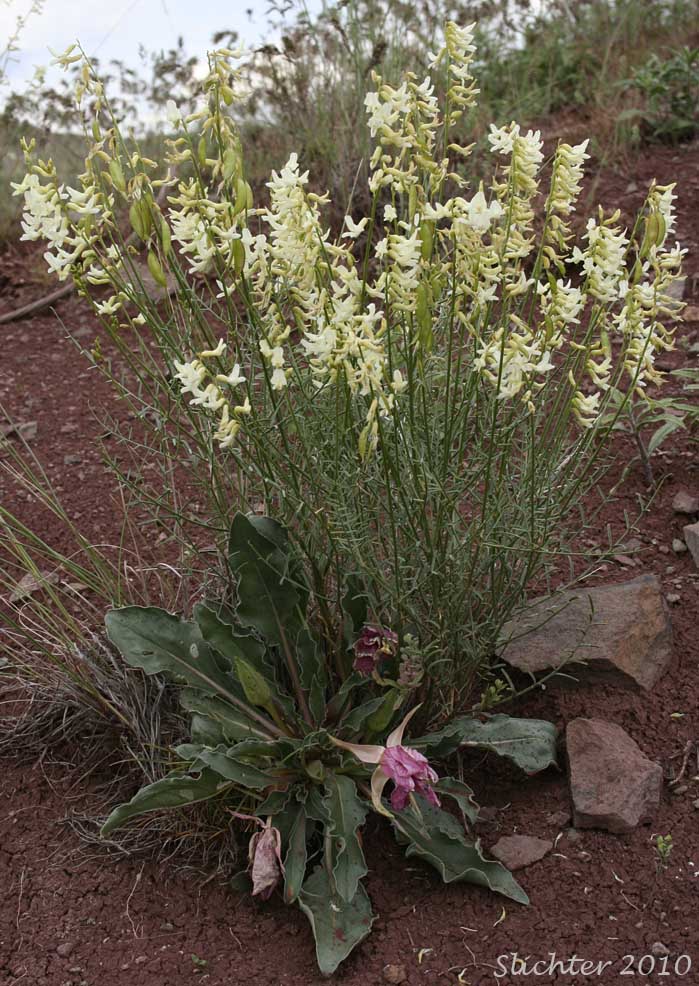
Threadstalk
milkvetch as seen on ash deposits along Oregon Highway 218 about one mile east of Clarno, OR..........May
14, 2010. Note the tufted evening primrose (Oenothera cespitosa ssp. cespitosa) at the base of the milkvetch.
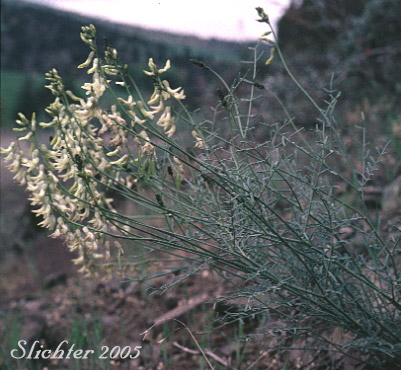 The photo at right
shows the upright form of threadstalk milk-vetch with its leafy, upright or ascending
stems toppedby numerous racemes of flowers and pendant pods ranging in height
between 0.5-1 meter. Photographed along Road 8 about 5 miles south of Mitchell,
OR...........May 24, 1998.
The photo at right
shows the upright form of threadstalk milk-vetch with its leafy, upright or ascending
stems toppedby numerous racemes of flowers and pendant pods ranging in height
between 0.5-1 meter. Photographed along Road 8 about 5 miles south of Mitchell,
OR...........May 24, 1998.
Characteristics:
Threadstalk milk-vetch is a perennial wildflower with clusters of slender erect
to ascending stems from 30-90 cm high arising from a branched crown atop a taproot.
The stems may be simple, but are often much-branched. The stems and leaves either
are covered with minute, appressed hairs or are nearly glabrous, and thus typically
appear fairly green. The pinnately compound leaves measure 6-10 cm long with
9-25 linear to linear-oblanceolate leaflets each from 0.7-2 cm long and 1-2
mm wide (See photo immediately below.).
The flower stem measues up to 20 cm long and typically exceeds the leaves.
The racemes are loosely 10-30 flowered. The pedicels are slender and measure
2-6 mm long while the calyx is an elongated bell up to 5 mm long with broad
but shallow teeth up to 1 mm long (See photo above.). The calyx is usually covered
with numerous white or blackish hairs appressed to the tube. The pale yellow
to whitish corolla is 10-12 mm long and are spreading or slightly nodding. The
banner is held erect while the lateral wings have rounded tips and are 1-4 mm
longer than the keel. The mature pods are green and laterally compressed. Their
outline is linear to narrowly oblong-elliptic and they are rounded at both ends.
The pods measure 15-35 mm long and 4-6 mm wide and have a long, slender stalk
that is 10-15 mm long (See photo below.). This slender stalk which attaches
the pod to the drying calyx is what gives this species it name of "threadstalk"
milk-vetch. The pods are generally glabrous.
Habitat:
Threadstalk milk-vetch may be found on the dry plains and sagebrush
desert and into the foothills.
Range:
Threadstalk milk-vetch is found from southern British Columbia
southward east of the Cascade Mts. to central Idaho and northeastern California,
eastward to central Nevada.
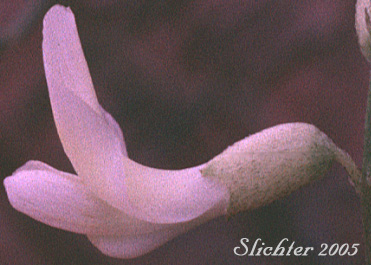
The photo above shows a close-up view of the flower of threadstalk
milk-vetch as seen north of Borax Lake in the Alvord Basin of southeastern Oregon.........May
28, 2000. Note that both the wings and banner are much longer than the keel,
which is sharply upcurved at its tip. The wings are also slightly upcurved
while the long banner is likewise curved sharply upwards to nearly a 90 degree
angle at midlength. Also note the calyx tube covered with short white and black
hairs and the short, broadly triangular calyx lobes.
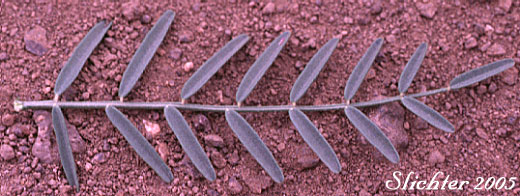
The photo above shows a stem leaf of threadstalk milk-vetch as
seen north of Borax Lake in the Alvord Basin of southeastern Oregon.........May
28, 2000. Note that the leaf would normally appear much greener and glabrous
than this photo shows.
 -
- 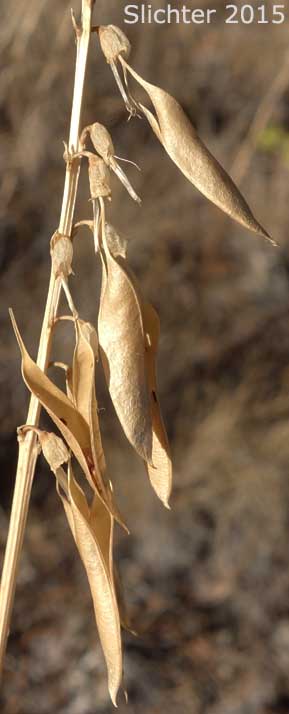 -
- 
The photo at left shows a close-up of the lanceolate pods of threadstalk
milk-vetch. This species "earns" its name from the long, narrow stipe
which extends from the calyx and whitish stamens to the pod. Note that the pod
is much compressed laterally. Photographed at the South Steens Mt. Campground
in southeastern Oregon...........May 26, 1996.
The photo at center shows the pods of threadstalk milk-vetch after releasing their seeds. The long stipe or stalk at the base of the pod is easily recognizable. Photographed on north-facing slopes of Sulphur Ridge in the South Fork Crooked River Wilderness Study Area..........October 25, 2015. The photo at right shows the maturing seed pods of threadstalk milkvetch as seen along the Rimrock Springs Trail #850, Crooked River National Grasslands.........June 24, 2017.
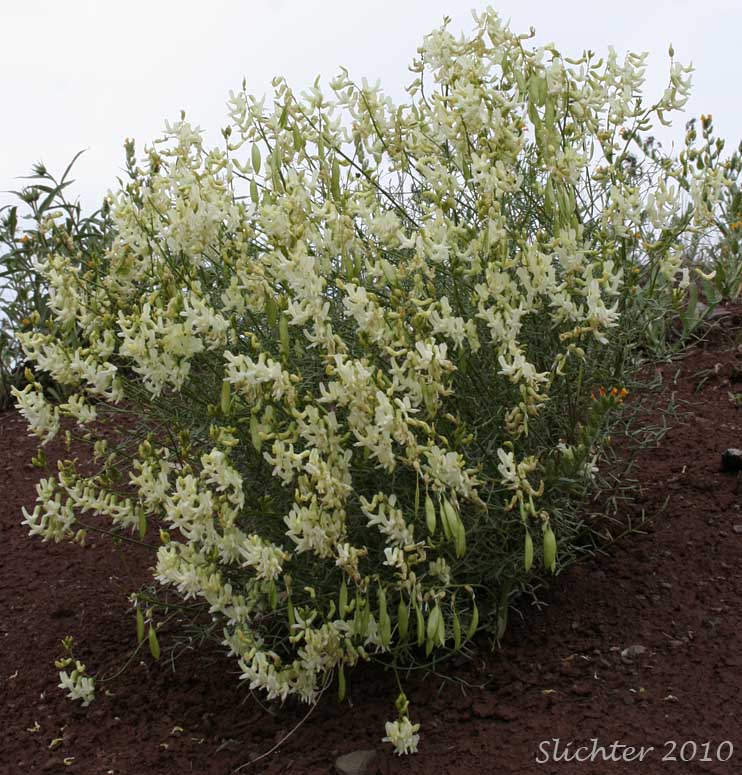 -
- 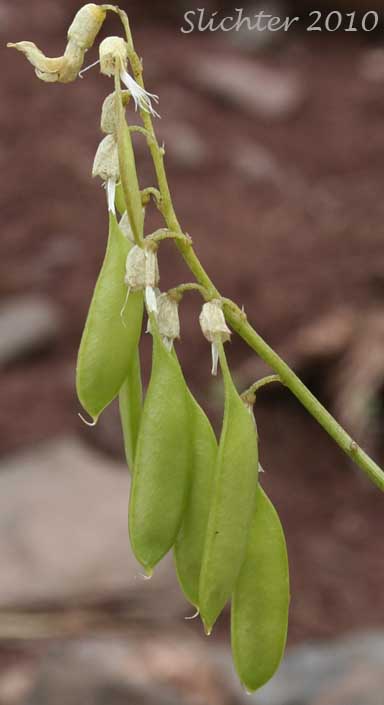
Additional close-ups of threadstalk
milkvetch as seen on ash deposits along Oregon Highway 218 about one mile east of Clarno, OR...........May
14, 2010.
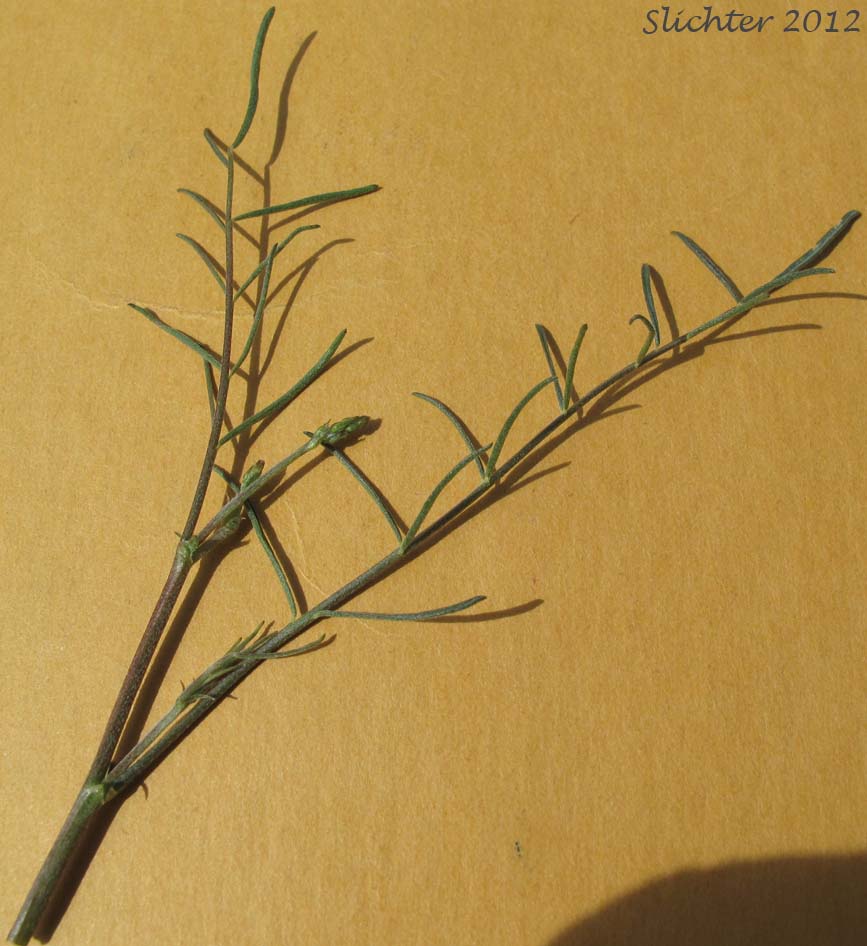
Stem leaves and flower buds of threadstalk milkvetch as seen on scabland grasslands about one-half mile east of the Odessa Craters parking area, Lincoln County, Washington........May 8, 2012.
 -
- 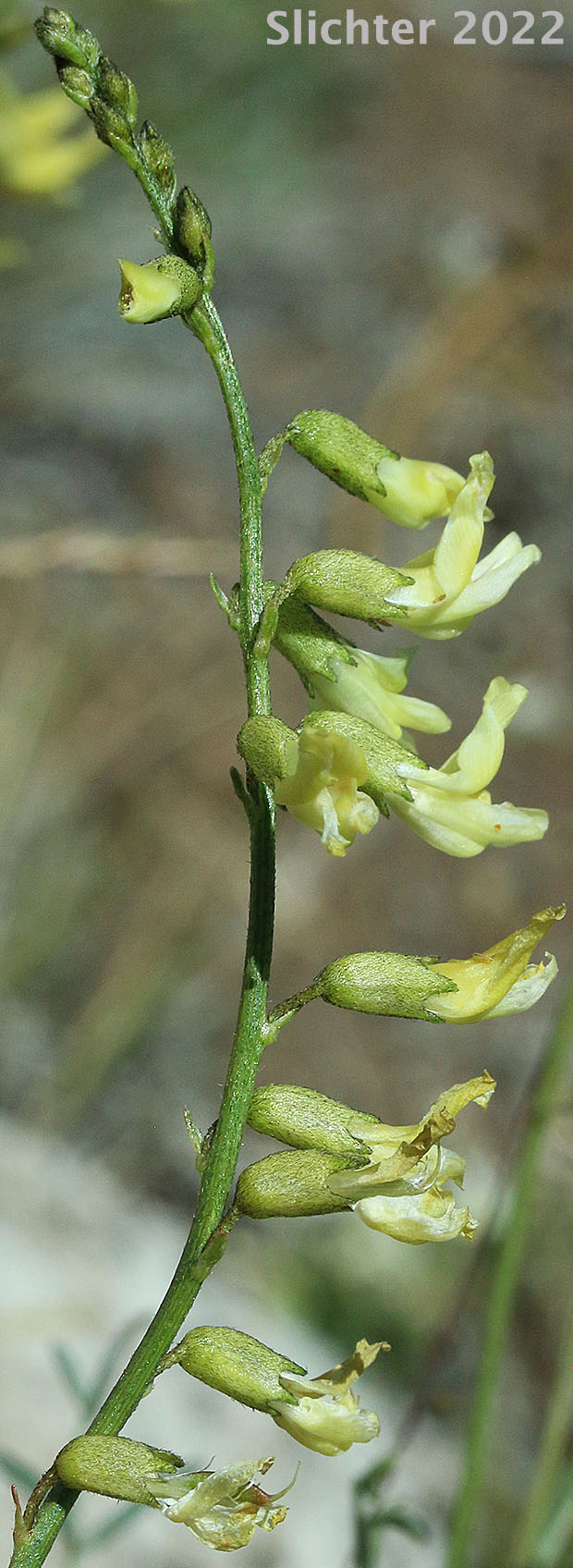 -
- 
Threadstalk milkvetch observed along the Fremont National Recreation Trail #160 on the west side of Twelvemile Peak, Fremont-Winema National Forest......July 16, 2022.
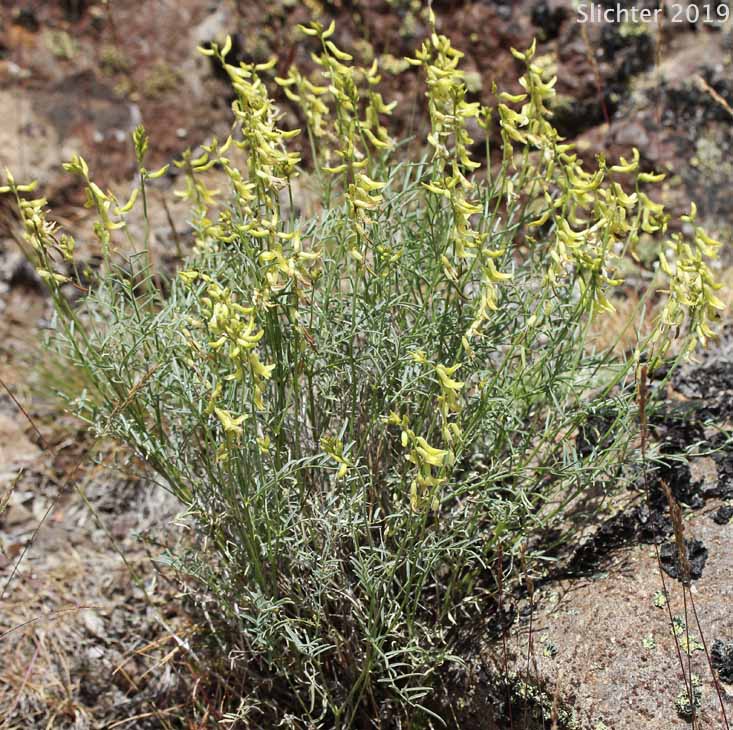 -
- 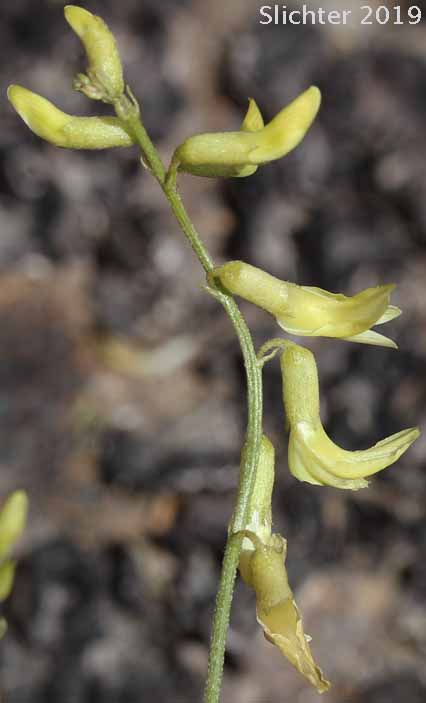 -
- 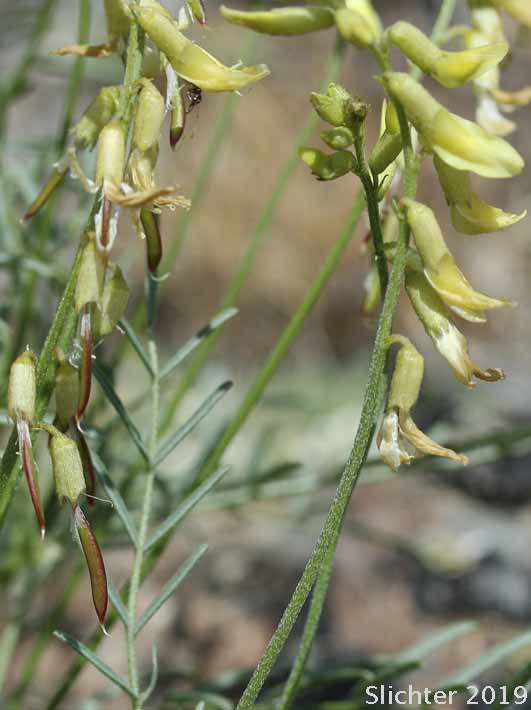
Threadstalk milkvetch in bloom along the Fremont National Recreation Trail #160 at a bald at about 7400' on the southeastern shoulder of Crook Peak, Fremont-Winema National Forest.......June 28, 2019.
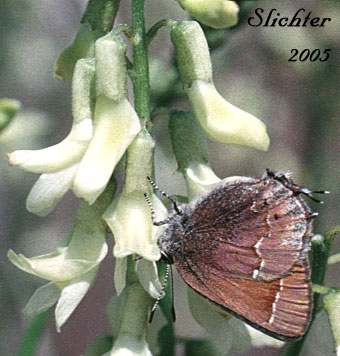
The photo above shows a close-up of the upper raceme of threadstalk
milk-vetch and a friend, possibly a cedar hairstreak (resting or nectaring?) along the highway a mile or
so north of Summer Lake in central Lake County, Oregon............May 26, 1996.
 -
- 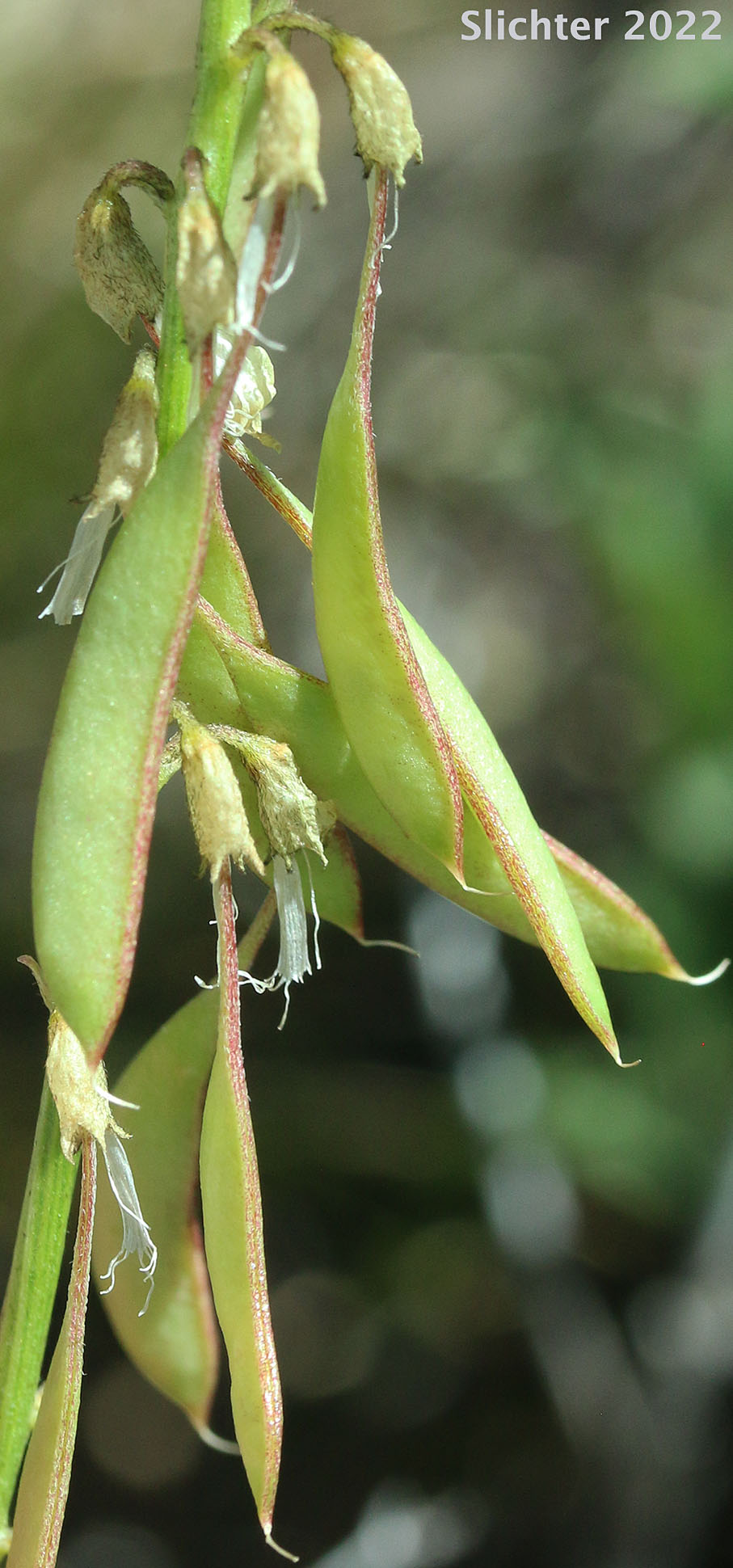
Fruits of threadstalk milkvetch observed along the Fremont National Recreation Trail #160 on the eastern slopes of Crook Peak, Fremont-Winema National Forest.......July 17, 2022.
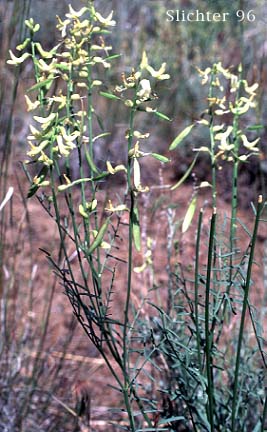
Threadstalk milk-vetch near Summer Lake, Or......June, 1995.
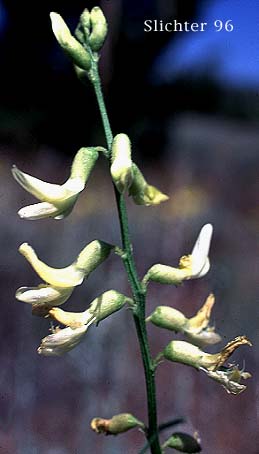
The photo above shows a contrasty close-up of the raceme of threadstalk
milk-vetch as seen near Summer Lake, Or........June, 1995.
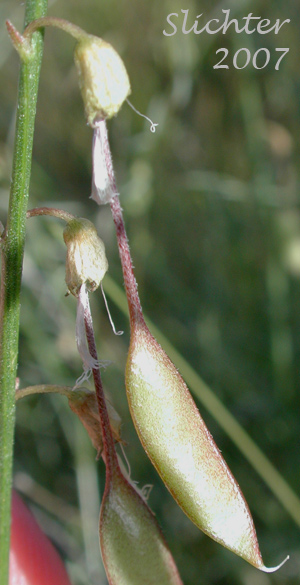
The photo above shows another view of the long stalked pod of threadstalk milk-vetch as seen at Wilson Creek, a BLM site several miles south of US Highway 2 in central Washington..........June 22, 2006.
Paul Slichter
 The photo at right
shows the upright form of threadstalk milk-vetch with its leafy, upright or ascending
stems toppedby numerous racemes of flowers and pendant pods ranging in height
between 0.5-1 meter. Photographed along Road 8 about 5 miles south of Mitchell,
OR...........May 24, 1998.
The photo at right
shows the upright form of threadstalk milk-vetch with its leafy, upright or ascending
stems toppedby numerous racemes of flowers and pendant pods ranging in height
between 0.5-1 meter. Photographed along Road 8 about 5 miles south of Mitchell,
OR...........May 24, 1998.
